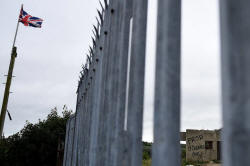|
Ireland stays top euro zone
center for financial special purpose vehicles
 Send a link to a friend
Send a link to a friend
 [August 18, 2017]
By John O'Donnell [August 18, 2017]
By John O'Donnell
FRANKFURT (Reuters) - Ireland remains the
euro zone's largest center for financial special purpose vehicles, data
from the European Central Bank (ECB) showed on Friday, placing it far
ahead of closest rival Luxembourg.
Such vehicles, many of which are shell companies set up to borrow or
invest, had assets, chiefly loans and debt, of 391 billion euros ($460
billion), which is greater than the Irish economy.
The data comes amid a debate in Ireland about its hosting of such
conduits, pitting critics, who see a risk to the country's reputation,
against those who want to keep them to help attract business from London
after Brexit.
The ECB data makes the sector in Ireland, as it stood at the end of
June, two thirds larger than in Luxembourg and bigger even than in
Italy, one of Europe's largest economies.

Special purpose vehicles are part of Ireland's offering to financial
firms looking to move from London ahead of Britain's departure from the
European Union. Ireland already accounts for roughly a fifth of such
activity in the euro zone and its dominance of the sector has held
steady compared with earlier such surveys.
The growth in the number of such companies has prompted criticism from
Irish lawmakers, however, who fear they could damage the reputation of
the country, which was nearly bankrupted by its own financial crash
during the credit crunch.
Ireland hosted numerous such vehicles before the crash that were linked
to banks hit in the turmoil.
Much of the current debate centers on one common Irish structure, known
as a Section 110 company, which cuts tax close to zero on financial
deals by creating exemptions from withholding tax, otherwise
automatically deducted from income.
TAX OPTIMIZATION
The companies, which typically have no full-time staff, have been used
perfectly legally by U.S. property investors, aircraft leasing firms,
European banks and Russian energy groups.
[to top of second column] |

A general view shows an area near the Northern Ireland and Ireland
border in Newbuildings, Northern Ireland August 16, 2017. REUTERS/Clodagh
Kilcoyne

Registered as ordinary companies, some vehicles hold loans on say, U.S.
property. They counterbalance interest payments received for those loans with
the cost of loan notes they have taken to invest, arriving at tax of close to
zero.
Restrictions apply to Irish property.
"Dublin has been quite aggressive in promoting itself," said Constantin Gurdgiev,
a professor of finance at the Middlebury Institute of International Studies in
California who has studied the country. "Ireland is a platform for tax
optimization, but also for doing business. It has access to the European
market."
Others are critical of the government for allowing the structures.
James Stewart of Trinity College Dublin, one of Ireland's leading experts in the
structures, fears problems could unfold if the sponsor of a Section 110 company
runs into trouble, triggering a knock-on effect through an opaque chain of
connected firms.
"What's the benefit for Ireland?" Stewart asked. "They pay minimal tax. They
have no staff. They have high leverage."
The Irish law underpinning special purpose vehicles was created by the
government in the early 1990s to build an international financial services
center in a then derelict part of Dublin, a central plank to the country's
economy and success.
Government officials said such financial vehicles create hundreds of jobs while
pointing to their importance as Ireland tries to attract banks to Dublin from
London.

($1 = 0.8507 euros)
(Reporting by John O'Donnell; Editing by David Holmes)
[© 2017 Thomson Reuters. All rights
reserved.] Copyright 2017 Reuters. All rights reserved. This material may not be published,
broadcast, rewritten or redistributed. |